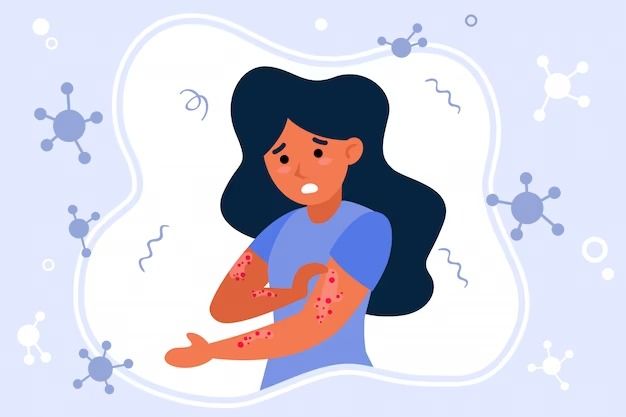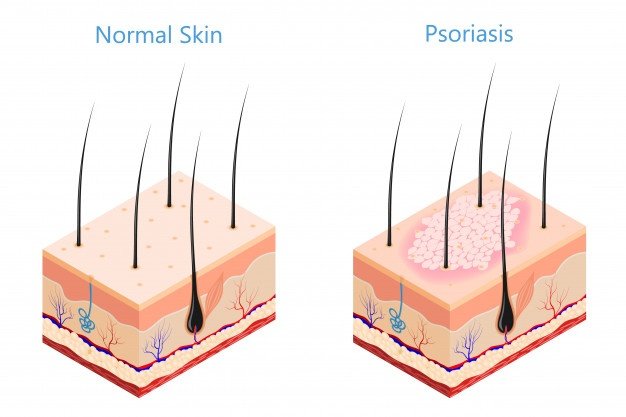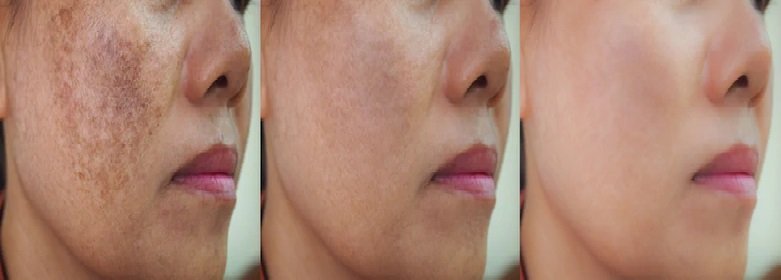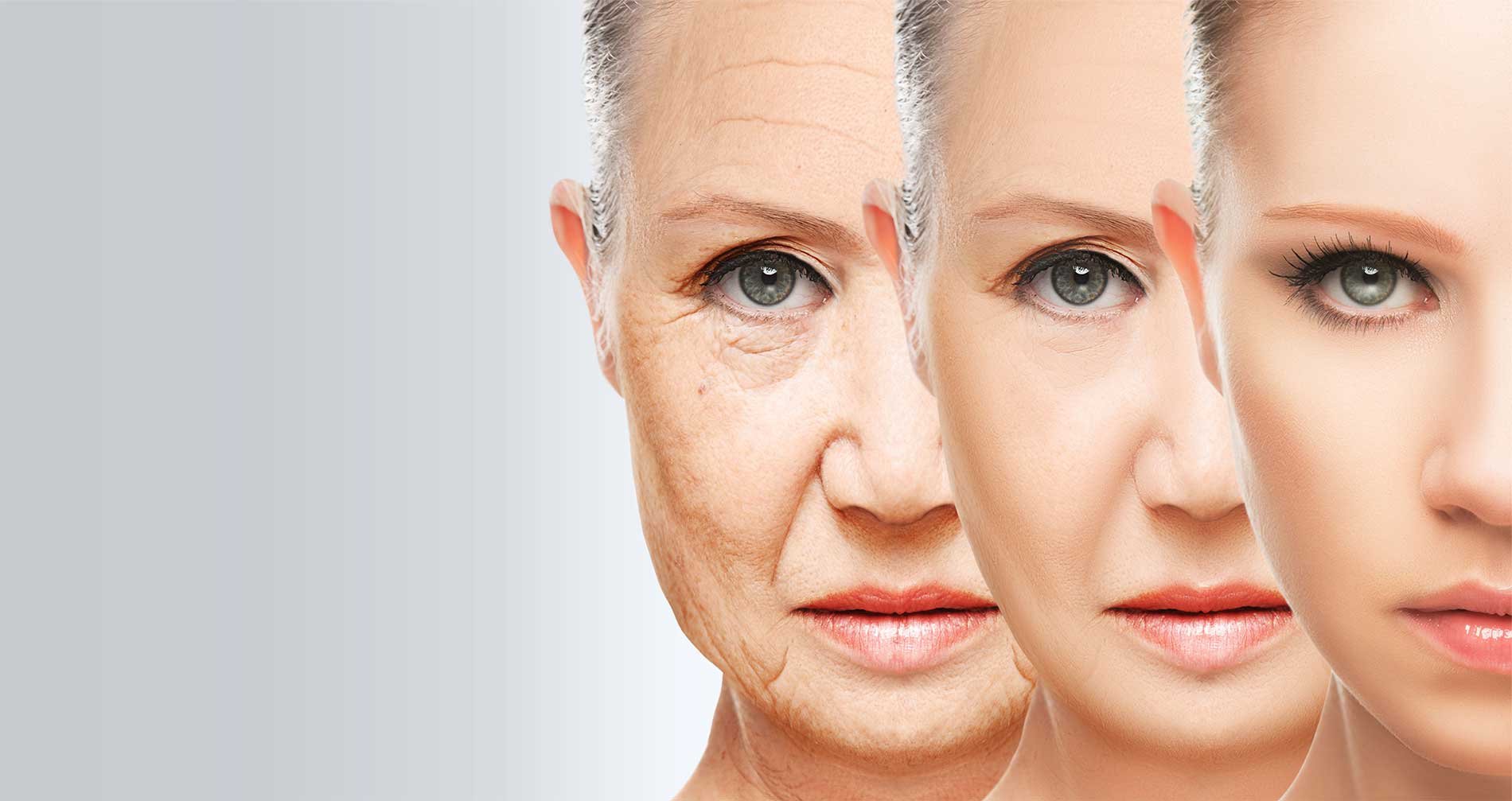

The cause of morphea is not accurately known. It might be caused by problems with your immune system. Morphea is not a communicable disease. Injuries, medications, chemicals, infections, or radiation can cause morphea.
Also, genetics plays an important role. If you have people in your family who have morphea, you may also get it.
Is morphea caused by stress? Read further to get your answers!
What is the link between Morphea and stress?

According to a study, there is evidence that suggests that stress may play a role in developing morphea.
Stress can lead to changes in your immune system. Stress causes alterations in the production of cytokines and other immune cells. This leads to the development of autoimmune disorders like Morphea.
Although, the relationship between stress and morphea is complex. It varies from person to person.
More research is needed to fully understand if morphea is caused by stress. Only then, it could be established whether stress management techniques can be used to manage morphea.
Your health is too important to ignore – schedule your appointment now.
To keep track of symptoms, continue reading below!
How is morphea caused?
The cause of morphea is not accurately known. It might be caused by problems with your immune system. Morphea is not a communicable disease. Injuries, medications, chemicals, infections, or radiation can cause morphea.
Also, genetics plays an important role. If you have people in your family who have morphea, you may also get it.
To keep track of symptoms, continue reading below!
What are the symptoms and diagnoses of morphea caused by stress?
There is currently no definitive way to diagnose morphea caused by stress. The exact cause of morphea is not fully understood. Hence, the symptoms and diagnosis for all forms of morphea are almost the same.
The symptoms used to identify morphea include:
Below mentioned are the ways in which morphea can be diagnosed:
- physical examination and evaluation of the symptoms.
- Skin biopsy-This is performed to confirm the diagnosis. It rules out the possibility of any other underlying issue.
- Imaging tests- X-ray and MRI are done if there is a concern for deeper involvement of tissue or bone.
- Blood tests-This rule out the presence of other autoimmune disorders that can have similar symptoms.
Continue reading, and evaluate the treatment options carefully!
Take charge of your health and your life. Contact us today!

What are the treatment options for morphea caused by stress?
Since the relationship between stress and morphea has not been clearly understood until now, it is difficult to say that stress management techniques would be useful to treat morphea.
Although, we have mentioned the possible options for the treatment of morphea. They are:
- Topical or oral medication
- Phototherapy
- Physical therapy
There is no specific treatment for morphea caused by stress. The treatment approach for morphea caused by stress is almost the same as for morphea caused by other issues.
However, stress management techniques can help reduce stress. This, in turn, helps with the overall well-being of the person.
Some of the stress management techniques you can try are:
- Relaxation exercise
- Mindfulness meditation
- Cognitive behavioral therapy
It is important to cope with the condition. Keep reading to understand the ways to cope with morphea.
How to cope with the emotional impact of morphea caused by stress?
This is a condition where your skin develops patches and doesn’t look very good. That is why there are various emotional impacts of morphea caused by stress. Coping with those emotions can be challenging. The strategies mentioned below can help you manage your feelings and cope with the adverse effects associated with them:
- Seeking emotional support- Reach out to your family and friends for emotional support. Also, you can join a support group, where people with morphea connect with each other and share their feelings.
- Stress management techniques- Include activities like mindfulness, yoga, or meditation in your daily routine. These activities help reduce anxiety and promote emotional well-being.
- Educate yourself- Try learning about morphea and gain a better understanding of the condition. This will make you feel more composed than anxious about the condition.
- Be compassionate to yourself- Be kind to yourself and practice self-compassion. Try to accept your condition and focus on ways to manage it.
Your well-being is our priority - call us to book your appointment today

What are the lifestyle changes to manage morphea caused by stress?
Making a few changes in your lifestyle can help manage the symptoms of morphea caused by stress. Here are some lifestyle changes that can help you:
- Manage your stress- Stress can trigger symptoms of morphea. Try stress-reducing methods like mindfulness, yoga, meditation, and listening to music to reduce your stress levels.
- Protect your skin- Do not use harsh soaps or hot water. Do not wear tight-fitting clothes. These things can irritate your skin. Also, use sunscreen to protect your skin from the sun.
- Use moisturizer - To prevent dryness and keep your skin hydrated, you must use a moisturizer. Remember, the moisturizer should be mild on the skin. This can prevent the morphea from getting worse.
- Exercise- Regular exercise can help reduce stress levels and promote overall well-being. Choose low-impact exercises such as walking, swimming, or yoga.
- Eat a healthy diet- Eat a balanced diet rich in whole grains, fruits, and vegetables. A healthy diet can improve overall health and promote skin health.
- Quit smoking- Smoking can cause skin damage. Quitting smoking can improve skin and overall health.
Is morphea linked to genetics? Read on to find out!

Is there a role for genetics in morphea development?
Yes, according to a study by NCBI, there is evidence that indicates the role of genetics in morphea development. Studies show a higher incidence of morphea in families with a history of autoimmune disorders. 15% of patients in the study reported a family history of morphea. Genetic mutations that affect the HLA system and interferon signaling pathways are associated with morphea development.
However, factors like infection and trauma to the skin also play a role in morphea development.
Morphea Caused by Stress and Other Autoimmune Disorders
While morphea is associated with stress, there are other autoimmune disorders that are also associated with stress.
- Lupus-lupus erythematous (SLE) is an autoimmune disease that affects multiple organs. It affects the skin as well. Individuals with SLE also have increased chances of developing morphea.
- Scleroderma- This is a very rare autoimmune disorder. This causes hardening and tightening of skin and connective tissues. Morphea can be considered a type of localized scleroderma.
- Dermatomyositis- Dermatomyositis is an autoimmune disorder that can cause muscle weakness and skin rashes. Morphea-like skin changes are frequently reported in some individuals with dermatomyositis.
- Hashimoto's thyroiditis- Hashimoto's thyroiditis is an autoimmune disorder that affects the thyroid gland. People with Hashimoto's thyroiditis have increased chances of developing morphea.

Morphea and the Importance of a Support System: Friends, Family, and Doctors
- Morphea can significantly impact an individual's physical and emotional well-being. Having a good support system of friends and family can help manage the condition. It also ensures a good quality of life for an individual.
- Friends and family can provide emotional support, encouragement, and practical assistance in daily activities. They help in relieving stress, which triggers morphe symptoms.
- People who are suffering from morphea caused by stress can connect with others who are going through the same situation. Support groups connect you with such people and allow you to share your feelings. This allows all of them to get the emotional support and assurance they need.
- Overall, having a strong support system is important for managing the physical and emotional impact of morphea. By working together with friends, family, and healthcare providers, people with morphea can achieve the best possible outcomes and maintain a good quality of life.
References:
https://www.ncbi.nlm.nih.gov/pmc/articles/PMC5383036/









